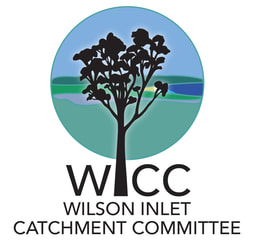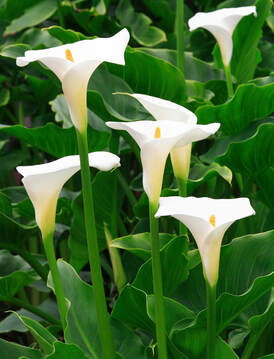Controlling Arum Lily
The Owingup Kent Grower Group (OKGG) met recently at the Kentdale Hall to explore options to control arum lilly (Zantedeschia aethiopica). Another South African escapee, arum lillies thrive in wet areas and if left unmanaged will quickly form a monoculture outcompeting native plants. Declared as a pest species on the West Australian Organisms List, landholders are legally required to control arum lilies under the Biosecurity and Agriculture Management Act 2007. Arum lilies are toxic to stock and deaths have occurred in WA.
Carl Dusenberg, from Dusenberg Land Garden and Environment Services, informed the OKGG that arum lilly thrives in Southwest WA because we lack the checks and balances that mitigates their proliferation in their native South Africa. Lilies are often spread by birds and to a lesser degree waterways. Carl said that arum lily can be controlled manually or chemically. Manual control can be carried out at any time of the year. You must ensure that you dig out the entire tuber and dispose of it, preferably by burning.
Chemical control is best carried out from July to November. Carl recommends to use the Bradley Method, focussing on the outliers in your infestation first and then working towards the main infestation. This will help keep your unaffected areas arum lily free. It is also handy to make a map of your property so you can record your infestation and control efforts as it can be difficult to remember what you sprayed the year before. It take a few years for chemical control to take out an arum lily as it will reshoot from its tuber in year two. Landholders sometimes give up in year two because they think the chemicals did not work. If sprayed again in year two you will notice the benefits in the third year. Work with your neighbours to have the greatest impact. Be persistent and you will best the arum lily beast.
Metsulphuron with an added surfactant such as Pulse is the most efficient chemical control. If you don’t use a surfactant you are wasting your time and chemicals. As always, when using surfactants, keep them out of our waterways and have a listen for frogs before applying. Surfactants act as a vector for any accompanying herbicides to poison our frogs as the surfactant allows the chemical to go through their permeable skins. Some landholders have found it handy to use dye or paint to mark which lilies that have been sprayed to ensure they hit everything.
The next OKGG meeting will be at the Kentdale Hall on 18 August with a focus on dung beetles. Learn how to acquire and care for your beetles to improve production, improve stock health and our waterways.
This program is funded in part by the Western Australian State Natural Resource Management Program. For further information visit www.wicc.org.au.

